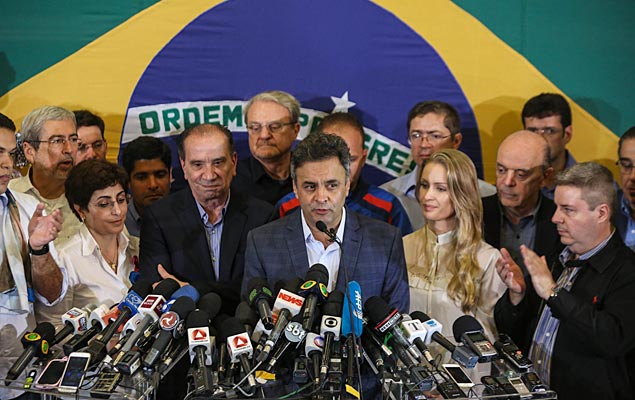Latest Photo Galleries
Brazilian Markets
12h03 Bovespa |
-0,14% | 129.028 |
16h43 Gold |
0,00% | 117 |
12h17 Dollar |
+0,39% | 5,0873 |
16h30 Euro |
+0,49% | 2,65250 |
ADVERTISING
Analysis: Neves Aims to Cement Position as Opposition Leader Ahead of 2018
10/27/2014 - 12h04
Advertising
VALDO CRUZ
FROM BRASÍLIA
Despite being defeated by President Dilma Rousseff in Sunday's (26) presidential election, Aécio Neves does not emerge weakened from the contest.
To the contrary, he is the opposition candidate who has caused most problems for the ruling Workers' Party (PT) since the victory of Luiz Inácio Lula da Silva in the elections of 2002.
The PT only breathed a sigh of relief and celebrated victory once the final result was confirmed. As an advisor to the President admitted, "Neves gave us quite a scare."
Nonetheless, Neves will have to reflect on his mistakes, the greatest of which was losing in Minas Gerais. While he won by a large margin in São Paulo, as expected, he was beaten again in his home state, by 52.4% to 47.6% - a near fatal blow to his election hopes.
He will have to rethink his relations with local politicians, who will be led now by Fernando Pimentel, a member of the PT and a personal friend of Rousseff, who became governor of Minas Gerais in the first round of voting.
It was Neves' first presidential election, and he will emerge from it both renovated, and in a sense, a different politician. He has shed the image of being a conciliator, after clashing repeatedly with Rousseff during the campaign.
Friends suggest this bullishness is what he was missing during his four years in the Senate, when he did not lead the fight against the PT in a convincing manner. Allies accused him of being too meek and passive.
However, forced into action by the PT's aggressive campaigning, Neves showed an appetite for a scrap which he is likely to maintain during Rousseff's second term. The aim is consolidate his position as leader of the opposition and run again in 2018, when he will still only be 58 years old.
He may have to fight for the privilege with Geraldo Alckmin, reelected as governor of São Paulo, who ran against Lula in 2006 and makes no secret of his desire to run for president again in the future.
Neves will feel confident of winning the nomination though, having the chance to consolidate his position in the Senate with the political capital accumulated during the campaign. His profile across the country has also increased significantly and will continue to do so over the next four years.
In addition, he will know what to expect next time around, and should be in a position to better defend himself against the personal attacks that characterized the PT's election strategy.
His opponent might be the ex-president Lula, who is considering a return to the presidency in four years. Neves was reportedly very disappointed by Lula's attitude during this campaign.
Lula and Neves had always enjoyed a positive relationship, with Neves being one of Lula's closest allies in the PSDB camp. However, friends suggest that a reconciliation will be impossible now, Lula having used personal attacks against Neves repeatedly on the campaign trail.
Read the article in the original language
| William Volcov/Brazil Photo Press/Folhapress | ||
 |
||
| The presidential candidate for the PSDB Aécio Neves (C) delivers a press conference in Belo Horizonte, after run-off elections |



